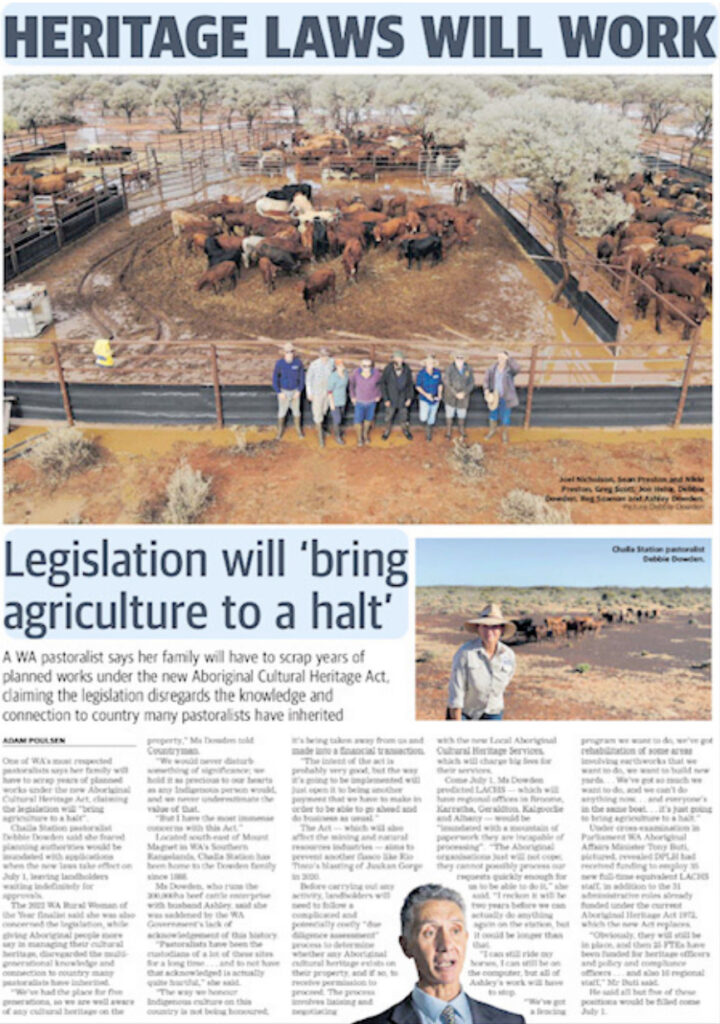
Article by Adam Poulson courtesy of Kalgoorlie Miner.

A respected WA pastoralist says her family will have to scrap years of planned works under the new Aboriginal Cultural Heritage Act, claiming the legislation will “bring agriculture to a halt”.
Challa Station pastoralist Debbie Dowden said she feared planning authorities would be inundated with applications when the new laws take effect on July 1, leaving landholders waiting indefinitely for approvals.
The 2022 WA Rural Woman of the Year finalist said she was also concerned the legislation, while giving Aboriginal people more say in managing their cultural heritage, disregarded the multi-generational knowledge and connection to country many pastoralists have inherited.
“We’ve had the place for five generations, so we are well aware of any cultural heritage on the property,” Ms Dowden told Countryman.
“We would never disturb something of significance; we hold it as precious to our hearts as any Indigenous person would, and we never underestimate the value of that.
But I have the most immense concerns with this Act.” Challa Station, located south-east of Mount Magnet, has been home to the Dowden family since 1888.
Ms Dowden, who runs the 200,000ha beef cattle enterprise with husband Ashley, said she was saddened by the WA Government’s lack of acknowledgement of this history.
“Pastoralists have been the custodians of a lot of these sites for a long time. . . and to not have that acknowledged is actually quite hurtful,” she said.
“The way we honour Indigenous culture on this country is not being honoured; it’s being taken away from us and made into a financial transaction.
“The intent of the act is probably very good, but the way it’s going to be implemented will just open it to being another payment that we have to make in order to be able to go ahead and do business as usual.”
The Act — which will also affect the mining and natural resources industries — aims to prevent another fiasco like Rio Tinto’s blasting of Juukan Gorge in 2020.
Before carrying out any activity, landholders will be required to follow a complicated and potentially costly “due diligence assessment” process to determine whether any Aboriginal cultural heritage exists on their property, and if so, to receive permission to proceed.
The process involves liaising and negotiating with the newly created Local Aboriginal Cultural Heritage Services, which will charge big fees for their services.
Come July 1, Ms Dowden predicted LACHS — which will have regional offices in Broome, Karratha, Geraldton, Kalgoorlie-Boulder and Albany — would be “inundated with a mountain of paperwork they are incapable of processing”.
“The Aboriginal organisations just will not cope; they cannot possibly process our requests quickly enough for us to be able to do it,” she said.
“I reckon it will be two years before we can actually do anything again on the station, but it could be longer than that.
“I can still ride my horses, I can still be on the computer, but all of Ashley’s work will have to stop.
“We’ve got a fencing program we want to do, we’ve got rehabilitation of some areas involving earthworks that we want to do, we want to build new yards. . .
We’ve got so much we want to do, and we can’t do anything now. . . and everyone’s in the same boat. . . it’s just going to bring agriculture to a halt.”















